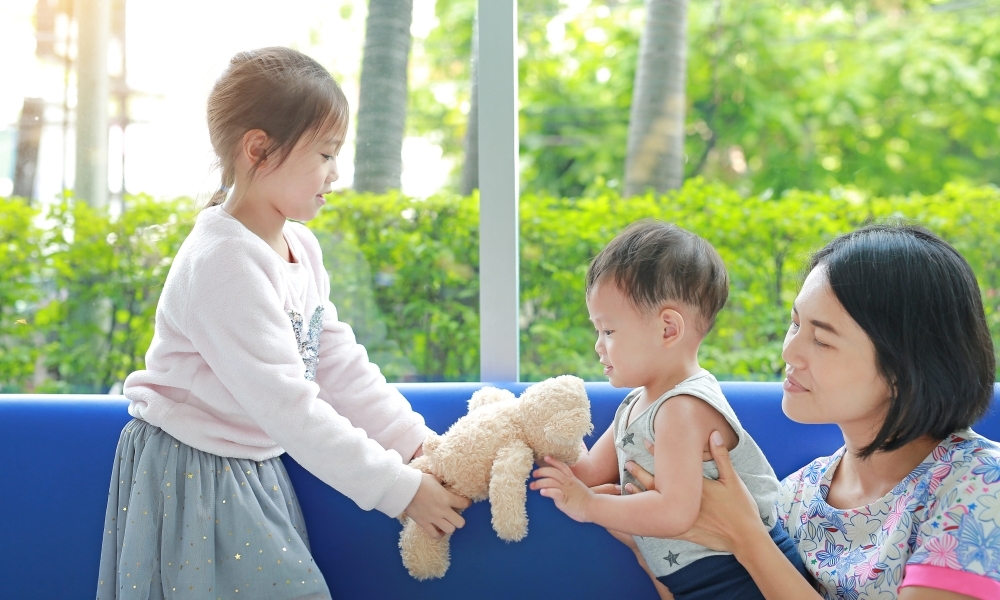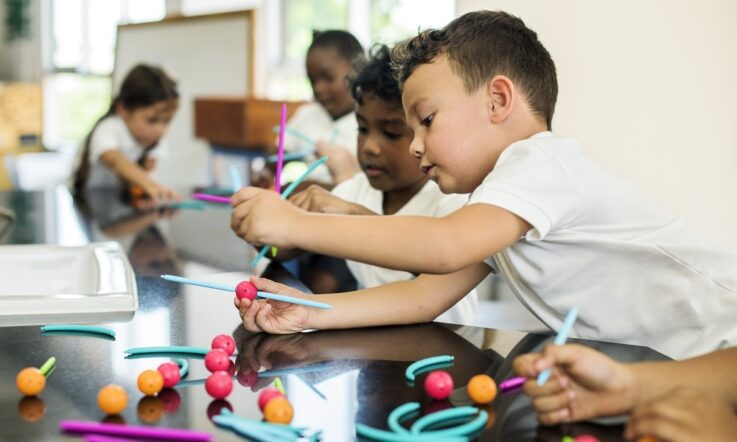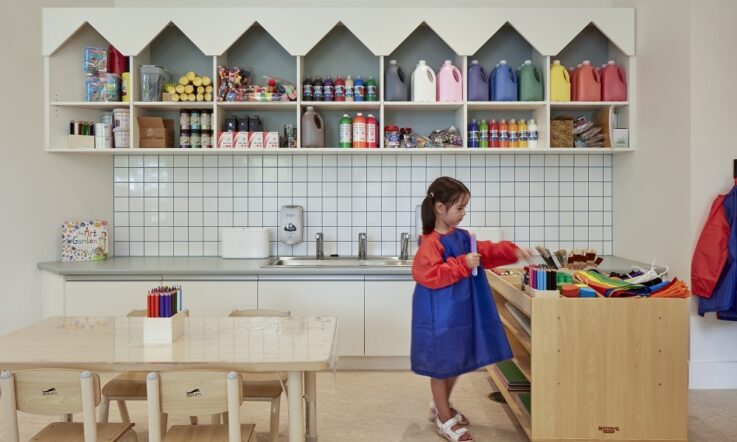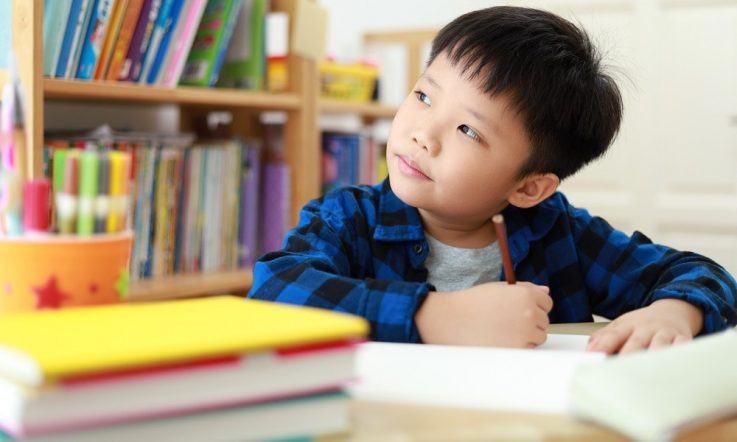‘The ability to take turns in communication and in play, and the ability to share resources actually enables children to build a whole range of essential skills, and dispositions such as patience, resilience, empathy, emotional regulation and the socially acceptable or pro-social behaviours.’ In the first instalment of a two-part Q&A, Lecturer in Early Childhood Education at the University of Tasmania, Lauren Armstrong, explains the importance of taking turns and sharing in early development of pro-social skills, their impact on school readiness, and current research on the topic.
Armstrong worked as a teaching associate at Monash University for six years before becoming an early career researcher in the field of early childhood education at the University of Tasmania. She has also worked in long day care settings, and in crèche settings with mixed age groups. Her current research involves early childhood policy development, educational reform, change management, curriculum pedagogy and assessment, and teacher education more broadly to support educators in the field.
Why is it important that young children learn how to take turns and share?
Firstly, learning to wait, taking turns, and sharing are all really important aspects of child development. We know that there is a significant connection to communication there (that back and forth and give and take process) through the way in which children are learning to take time to listen, and wait to speak or respond through language, and as they are developing their understandings of social cues.
And learning to share is quite complex. But it is a vital stage of a child’s development. In the early years of life, children are building attachment to people and things. So, in the first two years, they’re learning through their senses, and exploring the world around them, and the play of toddlers shifts from that parallel play alongside their peers to associate play. And that’s when there’s beginning to be some interactions with their peers.
However, between the ages of two and three years, a child’s social and emotional skills are still really in their early stages. So a child would be very unlikely to share a toy with peers – which often leads to some emotional distress and conflict that we see.
One focus in early childhood education for toddlers – my favourite age group – is to begin to emphasise respect and equality in relationships, and also the way that they use resources, objects and toys.
And we can see that really reflected in Outcome Two of the Early Years Learning Framework – this focus that we have in those early years is to allow us to support the development of these skills, and as they reach that three to six age range, they begin to build that capacity to feel quite content in sharing and cooperating with their peers as their type of play shifts from that associate play to more social play. So, we can see why these areas are really so essential to children’s learning and development.
Are there any recent shifts in the ways early childhood educators and researchers think about/write on this topic?
Yes, a little bit. The more traditional view about this is often related to school readiness and the need to learn how to share resources, and how to wait for their turn to speak or act. However, the emphasis upon agency and empathy in recent years has actually led educators and researchers to question why young children need to share their toys with others all the time.
For instance, there’s an early childhood educator from Seattle – Cassandra Tondreau – who published a piece in 2019 looking at rethinking the idea of sharing, and she asks the question, ‘How can we foster an empathetic response to play and sharing?’ (Tondreau, 2019). She argued that we need to challenge the idea of forcing children to share their special toys and whether it’d be justified to make them give up their toys as soon as others ask. Tondreau proposed that we need to be empathetic to the value and meaning that certain toys, and especially transition objects like comfort items, have for young children, and allow extended time with these resources and using communication, like modelling specific cues and creating actual pathways for children to engage in dialogue about their needs.
So, educators need to reflect on when and how sharing is appropriate. There are some strong links between the act of sharing and fostering children’s pro-social behaviours.
There’s a recent study from Beijing (Guo & Wu, 2021) that examines the level of empathy experienced by young children and their ability to engage in the act of sharing after viewing images that depicted happiness or sadness. It found that children with lower levels of empathy may possess what the authors called a ‘vulnerable empathy circuit’ that often appeared damaged. This led to children who experience sadness to portray more self-centred motivations and decreased pro-social behaviours.
So, they were less likely to share if they were feeling sad, and they were more internally focused. In contrast, children with higher levels of empathy appeared to actually possess a more stable empathy circuit, leading to greater motivations towards others and increased their pro-social behaviours. So ultimately, the children with greater empathy were able to share while experiencing feelings of sadness.
And I guess this study really resonates with what we often see in early childhood education. Some young children struggle with empathy and the influence it has on emotion and behaviour. And so it helps us to see why supporting children’s empathy in the early years is so important to their social and emotional development.
Another area that’s become prominent is the link between communicative turn taking and autism intervention in the early years. Researchers Kwangwon Lee and Ashley Staggs published a review of key literature in 2021 to better define the concept of turn taking in this area.
According to them, turn taking involves a form of pre-verbal and reciprocal communication that supports the development of language and joint attention skills – particularly when they’re integrated with interventions that target certain outcomes for children with autism.
And so there is quite a significant link there, and we can see that that communicative turn taking, and that back and forth dialogue can be an essential focus area for support for our young children, and particularly for children with learning disabilities and developmental delays. And so it sort of goes much broader than just taking turns, it’s so much deeper than that.
What impact can the development of these skills have on school readiness and success?
The ability to take turns in communication and in play, and the ability to share resources actually enables children to build a whole range of essential skills, and dispositions such as patience, resilience, empathy, emotional regulation and the socially acceptable or pro-social behaviours.
Children in the preschool years engage in social play that actually helps them to navigate social rules and expectations, how to interact, negotiate and cooperate with their peers, and how to manage conflicts and any associated emotions that arise – like the common occurrence of children saying to each other, ‘you’re not my friend anymore,’ or, ‘you’re not coming to my birthday party.’
So, it’s helping them to work through all of those things. And it’s an example of why teaching respectful relationships among young children has become such a strong focus in our early childhood curriculum and programs.
The emotive responses to turn taking and sharing are also quite important here, as children are learning empathy for others, how to regulate and express their emotions appropriately, and how to cope with disappointment.
We’ve all heard of the controversial statement often used in early childhood settings: ‘you get what you get, and you don’t get upset.’ And while there can be some connection to fostering resilience with that, we do need to be really cautious about dismissing children’s feelings, especially in situations which may seem unfair to them.
The social and emotional skills involved in learning to share and take turns can actually enable children to form positive relationships and strong friendships, interact confidently with others and successfully engage in school, and ultimately become confident and capable citizens in society.
The focus on school readiness has actually shifted in recent years from the need for children to be ‘made ready’ for school, to the need for schools to be ready for children.
There are some excellent perspectives around this idea from the works of Sue Dockett and Bob Perry, and others in the research sphere of school transition. So although children are supported in the preschool years to develop these skills, there’s also a responsibility for teachers in formal school settings to continue this work with children and their families. This allows for a greater level of continuity in the learning and development of children and as they are transitioning between early childhood and school contexts. There is quite a big emphasis on these skills and how it impacts on their later success in school and beyond.
Stay tuned: In tomorrow’s article, we talk further with Lauren Armstrong about some practical turn taking and sharing activities that educators can use to support children’s pro-social skills, including in the later years of primary school.
References and related reading
Guo, R., & Wu, Z. (2021) Empathy as a buffer: How empathy moderates the emotional effects on Preschoolers’ sharing. British Journal of Psychology, 112, 412-432. <https://bpspsychub.onlinelibrary.wiley.com/doi/full/10.1111/bjop.12466>
Lee, S., & Staggs, A. (2021). Defining turn taking in intervention for young children with autism: A review of the literature. Journal of Childhood, Education & Society, 2(2), 139-153. <https://www.j-ces.com/index.php/jces/article/download/104/56/742>
NSW Department of Education. (2020) Conversations on transition with Sue Dockett and Bob Perry. A NSW Government website – Education. Retrieved March 22, 2022 from <https://education.nsw.gov.au/teaching-and-learning/curriculum/early-learning/professional-learning/conversations-on-transition-with-sue-dockett-and-bob-perry>
Tondreau, C. (2019). Rethinking sharing. Exchange, July-August 2019, 14-15. <https://hilltopcc.com/wp-content/uploads/2020/01/Tondreau-Rethinking-Sharing.pdf>
In this Q&A, Lauren Armstrong talks about the recent emergence of agency and empathy in research about sharing in the early years, which has lead educators and researchers to question why young children need to share their toys all the time.
As a teacher, how can you embed this nuance into your teaching? How can you distinguish when sharing is appropriate, and when it’s okay for students to say no?



